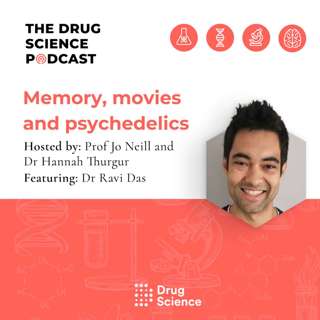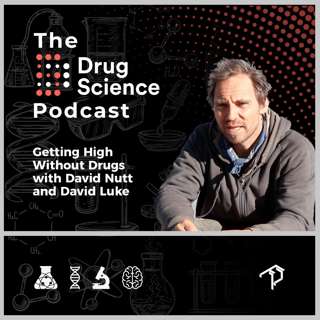
30. Getting High Without Drugs with Dr. David Luke
Psychologist Dr David Luke, is a Senior Lecturer studying states of transpersonal consciousness. It is well known that psychedelic drugs can induce altered states of consciousness but is this approach too heavy handed to derive benefit from a transpersonal experience? Activities such as yoga, meditation and sensory deprivation can induce this altered state of consciousness but how can we apply what we have learnt from psychedelic neuropsychopharmacology to evaluate these non-drug induced states? Can religious or spiritual experiences influence an individual’s perception of reality? Dr David Luke is Senior Lecturer in Psychology at the University of Greenwich. His research focuses on transpersonal experiences, anomalous phenomena and altered states of consciousness, especially via psychedelics, having published more than 100 academic papers in this area, including ten books, most recently Psychedelic Mysteries of the Feminine (2019). When he is not running clinical drug trials with LSD, doing DMT field experiments or observing apparent weather control with Mexican shamans he directs the Ecology, Cosmos and Consciousness salon and is a co-founder and director and the current chair of Breaking Convention: International Conference on Psychedelic Consciousness.William James James Fadiman Stanislav GrofAnechoic chamberHolotropic Breathwork Carbogen Inhalation TherapySynesthesiaBreaking Convention Extinction Rebellion Global Drug Survey AphantasiaBecome a Drug Science Community Member: https://www.donate.drugscience.org.uk/Twitter: @ProfDavidNutt @Drug_ScienceA Fascinate Productions podcast for Drug Science ★ Support this podcast ★
29 Sep 202040min
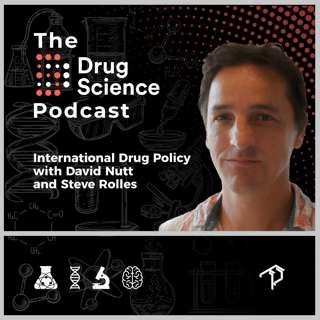
29. International Drug Policy with Steve Rolles
In 1971, the war on drugs went international when the UN Convention on Psychotropic Substances was signed into international law. This Convention broadened the scope of previous UN drug legislation, facilitating the prohibition of almost any drug imaginable at the time. However, in the past 50 years, various countries across the world have been rejecting this narrative and even the UN itself has agreed that the war on drugs has been a failure. Drugs are here to stay and it was foolish to think that they could be removed from society. An influential cog in this new approach to drug policy are a group called - Transform. Transform take a pragmatic and evidence-based approach to drug policy. Lobbying for harm reduction and alternatives to prohibition. Steve Rolles is Senior Policy Analyst for Transform Drug Policy Foundation, a UK based think tank and charity focused on drug policy and law reform. Lead author on a range of Transform publications including 2009’s ‘After the War on Drugs: Blueprint for Regulation’, Steve has been a regular contributor to the public debate on drug policy and law for over 15 years; in the media, at UK and international events, and at various UN and Government forums around the world. Steve was recently an adviser for the Uruguayan Government in developing their new cannabis regulation model, and was also lead drafter and technical coordinator for the recent ‘Taking control: Pathways to Drug Polices that Work’ report from the Global Commission on Drug Policy. Previously Steve worked for Oxfam and the Medical Research Council, having studied for his Geography BSc at Bristol University and Development Studies MSc at Manchester University.Transform Danny Kushlick Mexico Unido Contra DelincuenciaPortugal decriminalisation Cannabis legalisation in Canada Cannabis legalisation in Uruguay Altered States report William Hague advocating for cannabis reform Global Commission on Drug Policy Lib Dem cannabis report UN common position on drugs UN task team report on the past 10 years of drug policy Latin America cocaine warLuxembourg cannabis reformBecome a Drug Science Community Member: https://www.donate.drugscience.org.uk/Twitter: @ProfDavidNutt @Drug_ScienceA Fascinate Productions podcast for Drug Science ★ Support this podcast ★
22 Sep 202048min
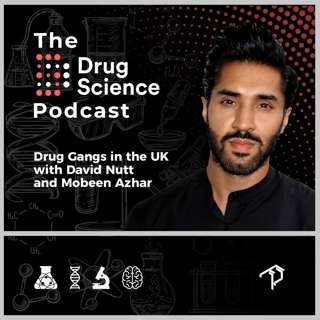
28. Drug Gangs in the UK with Mobeen Azhar
Mobeen Azhar has been a journalist for 17 years investigating the societal harms related to the ‘war on drugs’. Upon returning to his hometown of Huddersfield, Mobeen started to uncover grizzly story behind the roadside execution of Yassar Yaqub. Described in court as a 28-year-old office clerk, Yassar Yaqub was shot dead by police on an M62 slip road on a cold and wet January evening in 2017. Celebrated by his family as a loving son and beloved father, his death lead to protests on the streets of West Yorkshire and in the wake of the Black Lives Matter movement a ‘Justice 4 Yassar’ campaign was born. But with rumours of drug empires, money laundering and high-performance cars, just days into his reporting of the case, Mobeen realises that there is a much bigger story in town. With violence on the streets and a town that is terrified to talk, Mobeen attempts to find out where the truth really lies in a journey that forces him to face some ugly truths about his community and hometown. Hometown Justice for Yassar Neil WoodsBecome a Drug Science Community Member: https://www.donate.drugscience.org.uk/Twitter: @ProfDavidNutt @Drug_ScienceA Fascinate Productions podcast for Drug Science ★ Support this podcast ★
15 Sep 202053min
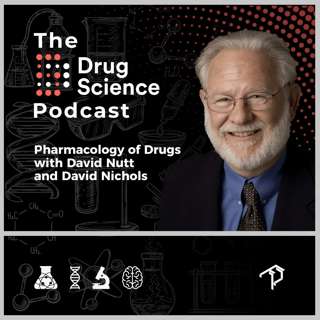
27. Pharmacology of Drugs with Dr David Nichols
A special treat this week as the two titans of psychopharmacology discuss the medicinal chemistry of psychedelics. Dr Nichols is the Founding President of the Heffter Research Institute, an organisation designed to promote research of the highest scientific quality with psychedelics in order to contribute to a greater understanding of the mind leading to the improvement of the human condition, and to alleviate suffering.Professor Nutt and Dr Nichols answer some burning questions of psychedelic science such as: What will come to market first, LSD, Psilocybin or MDMA? Could microdosing be dangerous? Is there such a thing as DMT tolerance? David E. Nichols, is currently an Adjunct Professor in the Eshelman School of Pharmacy at the University of North Carolina, Chapel Hill, NC. He is a Distinguished Professor Emeritus at the Purdue University College of Pharmacy, and was the Robert C. and Charlotte P. Anderson Chair in Pharmacology, where he carried out teaching and research for 38 years prior to his retirement in 2012. A major focus of his research was on substances known as hallucinogens, known more popularly as psychedelics. Widely published in the scientific literature and internationally recognized for his research on centrally active drugs, he has studied all of the major classes of psychedelic agents, including LSD and other lysergic acid derivatives, psilocybin and the tryptamines, and phenethylamines related to mescaline. Among scientists, he is recognized as one of the foremost international experts on the medicinal chemistry of psychedelics.Shulgin Mescaline MDMA LSD Psilocybin Entactogen vs Empathogen Drugs Enforcement Agency Salvia Heffter Research Institute Arthur Heffter Psilocybin for depression trial Psilocybin for OCD Yale study Psilocybin-assisted Group Therapy for Demoralization in Long-term AIDS SurvivorsN,N-dimethyltryptamine and the pineal gland: Separating fact from mythA Model for the Application of Target-Controlled Intravenous Infusion for a Prolonged Immersive DMT Psychedelic ExperienceFen-phen Weightloss drug Synthesis and Biological Evaluation of Tryptamines Found in Hallucinogenic Mushrooms: Norbaeocystin, Baeocystin, Norpsilocin, and AeruginascinBecome a Drug Science Community Member: https://www.donate.drugscience.org.uk/Twitter: @ProfDavidNutt @Drug_ScienceA Fascinate Productions podcast for Drug Science ★ Support this podcast ★
8 Sep 202043min
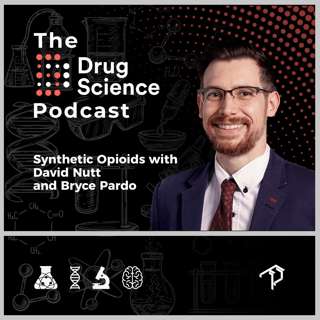
26. Synthetic Opioids with Bryce Pardo
The US opioid crisis is a result of a fractured and fragmented healthcare service. Federal and state policy created a system whereby doctors were rewarded for prescribing highly addictive substances. This epidemic was compounded when the same federal and state government suddenly restrained these prescriptions, forcing people into the black market. Now underground drug dealers control this oversaturated demand, from Mexican smugglers to Chinese clandestine chemists…the harms of opiates are rising every day. Bryce Pardo is an associate policy researcher at the RAND Corporation. His work focuses on drug policy with a particular interest in the areas of cannabis regulation, opioid control, and new psychoactive substance markets. Recently, he has provided Congressional testimony about his research on illicit supply of fentanyl to several subcommittees within the U.S. House of Representatives. Prior to joining RAND, he served five years as a legislative and policy analyst at the Inter-American Drug Abuse Control Commission (CICAD) within the Organization of American States (OAS) where he worked directly with policymakers and practitioners. He has independently consulted with multi-lateral institutions, including the Pan-American Health Organization (PAHO) and the United Nations Office on Drugs and Crime (UNODC). Pardo also served as lead analyst with BOTEC Analysis Corporation to support the Government of Jamaica in drafting medical cannabis regulations. The Future of Fentanyl and Other Synthetic OpioidsRAND Corporation RAND Drug Policy Research Centre Heroin Oxycodone Oxycontin 2010 additive added to prescription opiates so they couldn’t be crushed or snorted Golden triangle Fentanyl BuprenorphineMethadone Vivitrol Heroin Assisted Treatment Supervised consumption facility Isotonitazene CarfentanilBecome a Drug Science Community Member: https://www.donate.drugscience.org.uk/Twitter: @ProfDavidNutt @Drug_ScienceA Fascinate Productions podcast for Drug Science ★ Support this podcast ★
1 Sep 202053min
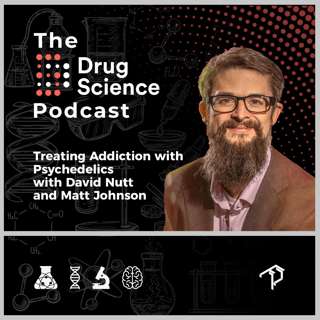
25. Psychedelics for Addiction with Professor Matt Johnson
Tobacco and alcohol are the largest sources of preventable death in the world. Our current treatments are only 15% effective at best. However, psilocybin-assisted therapy has achieved an astonishing 80% success rate in clinical trials. Professor Matthew Johnson is paving the way for this new an innovative treatment to address one of the most damaging social burdens of modern society, drug addiction. It is important to note that Professor Johnson’s research is not looking at casual habitual smokers, but instead, long-term, treatment resistant tobacco users. Matthew W. Johnson, Ph.D., Professor at Johns Hopkins, has worked with psychedelics since 2004. He published psychedelic safety guidelines in 2008, the first psychedelic treatment of tobacco addiction in 2014, and with colleagues published the largest study of psilocybin in cancer distress in 2016. His 2018 psilocybin review recommended Schedule IV upon medical approval. He is Principal Investigator on upcoming psilocybin studies treating opioid addiction and PTSD, and LSD research treating chronic pain. Matt and the Johns Hopkins Psychedelic Research Unit are examining the long-term behavioural changes resulting from a single psilocybin session and cognitive behavioural therapy. Johns Hopkins Psychedelic Research Unit Professor Matthew Johnson Smoking cessation study Smoking cessation research Roland Griffiths Episode Healthy normals research Smoking cessation behaviours three months following acute insular damage from stroke IbogaineBreathwork for treating PTSD Twitter - @Drug_Researcher Become a Drug Science Community Member: https://www.donate.drugscience.org.uk/Twitter: @ProfDavidNutt @Drug_ScienceA Fascinate Productions podcast for Drug Science ★ Support this podcast ★
25 Aug 202051min
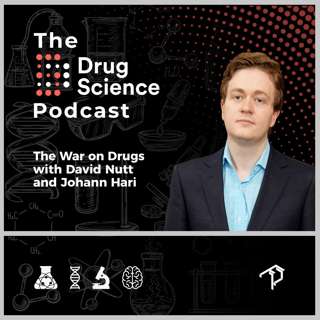
24. The War on Drugs with Johann Hari
This week, Professor Nutt speaks to journalist Johann Hari @johannhari101 about the ‘war on drugs’. It is now widely accepted that the ‘war on drugs’ has failed, with many people believing it can never succeed. Despite this, politicians from around the world continue to follow this mantra as an effective strategy to reduce drug-related harms. The reason why… politics. Currently, it is politically damaging to support the legalisation of drugs because public discourse has been led to believe that legalisation will cause anarchy and chaos. Contrarily, what we have now is a complete lack of control. Legally regulating the supply of drugs is the only way to bring order to this chaos. Johann Hari is the author of two New York Times best-selling books. His first, ‘Chasing the Scream: the First and Last Days of the War on Drugs’, is currently being adapted into a major Hollywood film by Oscar-winning director Lee Daniels, and into a non-fiction documentary series. His first TED talk, ‘Everything You Think You Know About Addiction is Wrong’, has been viewed more than 40 million times across all platforms. He has written over the past decade for some of the world’s leading newspapers and magazines, including the New York Times, the Los Angeles Times, the Guardian, the Spectator, Le Monde Diplomatique, the Melbourne Age, and Politico. He is a regular panellist on HBO’s Realtime With Bill Maher.Chasing the Scream Lost ConnectionsProfessor Nutt fired Portugal decriminalisation Bud OsbornSafe injection facilities Philip Owen – coffin Billie Holiday Strange Fruit Ruth DreifussNeil Woods episode Swiss experiment Crispin Blunt episode Harry Anslinger Become a Drug Science Community Member: https://www.donate.drugscience.org.uk/Twitter: @ProfDavidNutt @Drug_ScienceA Fascinate Productions podcast for Drug Science ★ Support this podcast ★
18 Aug 202053min
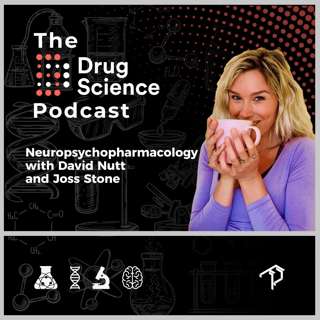
23. Neuropsychopharmacology with Joss Stone
The tables have been turned in this one-off special of the Drug Science podcast. In this episode, Professor David Nutt is interviewed by renowned singer-songwriter – Joss Stone. Professor Nutt is the Chair of the Drug Science Scientific Committee and currently the Edmund J Safra Professor of Neuropsychopharmacology and Head of the Neuropsychopharmacology Unit at Imperial College London. Professor Nutt has steered the psychedelic renaissance toward legitimate research in the UK enabling the next generation of researchers to expand our understanding of these substances. In this week’s episode, Professor Nutt is interviewed by singer-songwriter Joss Stone. Joss became a friend of the show after appearing in our first season of the podcast to talk about Medical Cannabis. Now she’s back to ask the Professor some burning questions about cannabis, psychedelics, SSRI’s, Adderall, addiction and pain. A Cuppa Happy podcastUnited Patients Alliance Medical cannabis slides CannabisPrescribed CBD could help people quit cannabisTwenty21NICE guidelineHarry AnslingerMedical Psychedelics Working Group Become a Drug Science Community Member: https://www.donate.drugscience.org.uk/Twitter: @ProfDavidNutt @Drug_ScienceA Fascinate Productions podcast for Drug Science ★ Support this podcast ★
11 Aug 202039min
